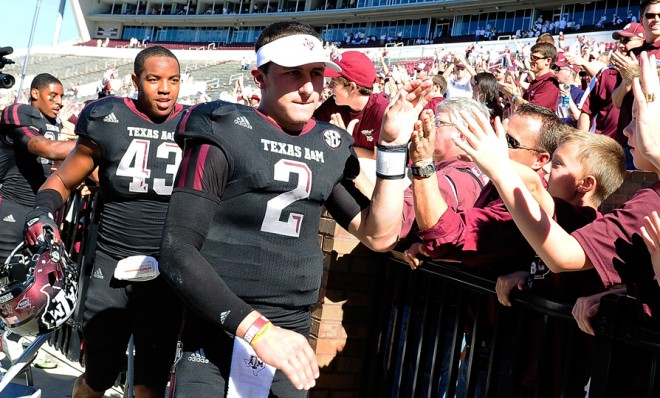Is it finally time to start paying college athletes?
NCAA revenue in 2011-12: $871.6 million. Student athletes' cut: $0.


A free daily email with the biggest news stories of the day – and the best features from TheWeek.com
You are now subscribed
Your newsletter sign-up was successful
Reigning Heisman Trophy winner Johnny Manziel has already led Texas A&M to two blowout victories this year. Yet the biggest story of the young college football season is not Manziel's bid to become only the second player to ever repeat as Heisman champ, but rather whether he should have been allowed to make a few thousands bucks for signing his name on a bunch of tchotkes.
Yes, with the return of college football has come the perennial argument over whether student athletes should be paid. On the one side, some say college players are already compensated plenty in scholarships and on-campus perks. On the other, critics of the enormous money machine that is the NCAA say it's laughable that "everyone in the business of college sports gets rich except the players," as the New York Times' Joe Nocera puts it.
Manziel got the conversation going again this year when it was revealed he was under investigation for allegedly accepting cash payments in exchange for signing memorabilia (he was later found more or less innocent, and slapped with a strange half-game suspension). That struck many as an odd double-standard, given how handsomely Texas A&M and the NCAA have profited off Manziel's prowess on the field.
The Week
Escape your echo chamber. Get the facts behind the news, plus analysis from multiple perspectives.

Sign up for The Week's Free Newsletters
From our morning news briefing to a weekly Good News Newsletter, get the best of The Week delivered directly to your inbox.
From our morning news briefing to a weekly Good News Newsletter, get the best of The Week delivered directly to your inbox.
Texas A&M's athletic department earned $120 million in 2012, sixth-most of any school in the nation. One study estimated the college received $37 million in free media exposure over a three-month period because of Manziel and the football team's success. And boosters even auctioned off a dinner with Manziel for $20,000, though none of the money went to the quarterback himself.
The college also sold jerseys with Manziel's number for $60 a pop. So, too, did the NCAA, until it was revealed that the NCAA's site directly linked players' names to merchandise, an embarrassing controversy that forced the collegiate athletics body to discontinue selling any team-specific gear.
No one disputes that colleges and the NCAA reap millions every year off college athletes. The NCAA reported $871.6 million in revenue for the 2011-12 academic year.
To some, that's blatant exploitation. Nocera, who was ahead of the recent pro-pay wave, wrote two years ago that, "The hypocrisy that permeates big-money college sports takes your breath away."
A free daily email with the biggest news stories of the day – and the best features from TheWeek.com
"What does the labor force that makes it possible for coaches to earn millions, and causes marketers to spend billions, get? Nothing," he wrote.
A common refrain from those opposed to paying students is that athletes are, in fact, already compensated greatly.
Student athletes receive fat scholarships unavailable to their non-athlete peers. And that compensation is the only way some high schoolers even attend college in the first place, as CBS's Doug Gottlieb points out.
"How many scholarships are given to athletes who never would have received the chance to go to college, much less to have free everything while there?" he asks. "While there are some tangibles within the business of college sports we can put a dollar value on, there is no calculation on simply getting into college."
With the cost of college skyrocketing, scholarships are becoming even more valuable than ever. Yet critics say that compensation is far from adequate given the extreme burdens placed on college athletes.
Paying student athletes beyond scholarships is "an ethical imperative," says TIME's Sean Gregory, since they are essentially offering free labor that precludes them from obtaining a paying job to cover college's hidden expenses.
Players are essentially working full-time jobs while going to school; they deserve to be paid more than a scholarship. Because even full-ride athletic scholarships don't cover the full cost of attending school, athletes are often short a few thousand bucks for ancillary expenses on top of tuition, room and board, books, and fees: Money for gas, shampoo, and, yes, maybe a few beers. Some athletes are on only partial scholarship or are walk-ons still paying full tuition. [Time]
A few college coaches are coming around on the issue. Texas head football coach Mack Brown endorsed the idea earlier this year, saying "players are killing themselves" for no money while the college makes millions.
That could all change soon. A lawsuit brought against the NCAA by former UCLA hoops star Ed O'Bannon is challenging whether the NCAA and others — in this case, a video game company — can profit off the names and likenesses of student athletes. The trial is not set to begin until next year, but it could strike a blow against the existing dynamic of college sports revenue.
Jon Terbush is an associate editor at TheWeek.com covering politics, sports, and other things he finds interesting. He has previously written for Talking Points Memo, Raw Story, and Business Insider.
-
 The UK expands its Hong Kong visa scheme
The UK expands its Hong Kong visa schemeThe Explainer Around 26,000 additional arrivals expected in the UK as government widens eligibility in response to crackdown on rights in former colony
-
 One great cookbook: Joshua McFadden’s ‘Six Seasons of Pasta’
One great cookbook: Joshua McFadden’s ‘Six Seasons of Pasta’the week recommends The pasta you know and love. But ever so much better.
-
 Scientists are worried about amoebas
Scientists are worried about amoebasUnder the radar Small and very mighty
